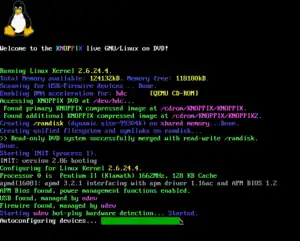Virtual console
A virtual console (VC) – also known as a virtual terminal (VT) – is a conceptual combination of the keyboard and display for a computer user interface. It is a feature of some Unix-like operating systems such as Linux, BSD, illumos, UnixWare, and macOS in which the system console of the computer can be used to switch between multiple virtual consoles to access unrelated user interfaces. Virtual consoles date back at least to Xenix[1] and Concurrent CP/M in the 1980s.[2]

In the Linux console and other platforms, usually the first six virtual consoles provide a text terminal with a login prompt to a Unix shell. The graphical X Window System traditionally starts in the seventh virtual console (tty7), although this is configuration dependent. In Linux, the user switches between them by pressing the Alt key combined with a function key – for example Alt + F1 to access the virtual console number 1. Alt + ← changes to the previous virtual console and Alt + → to the next virtual console. To switch from the X Window System or a Wayland compositor, Ctrl + Alt + F1 works. (Note that users can redefine these default key combinations.)
If several sessions of the X Window System are required to run in parallel, such as in the case of fast user switching or when debugging X programs on a separate X server, each X session usually runs in a separate virtual console.
Implementation details
Unix systems
Unix workstations, such as those manufactured by Sun or Silicon Graphics, did not include virtual consoles. The only purpose of a console would be to fix the system so that the graphical environment could start.
Sun Niagara-based servers running virtualization with Logical Domains get virtual console services from the Control domain.
See also
- Virtual desktop, works similar to a virtual console, but operates on graphical desktops instead of a command prompt
- System console for the non-virtual console
- Text terminal for the textual interface in general
- Pseudo terminal for even more virtual consoles
- Terminal emulator for an application program that has the same function as a textual virtual console
Notes
- "Trusted path mechanism for virtual terminal environments". FreePatentsOnline.com. Retrieved 2008-04-09.
United States Patent 4945468 lists Xenix as prior art in this area. - Guzaitis, Joe (November 1983). "Concurrent CP/M". BYTE. pp. 257–268. Retrieved 19 March 2016.
References
- FreeBSD Handbook, chapter 3.2 Virtual Consoles and Terminals